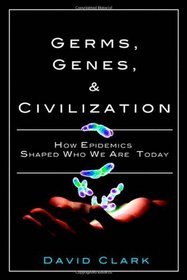Search -
Germs, Genes, & Civilization: How Epidemics Shaped Who We Are Today
Germs Genes Civilization How Epidemics Shaped Who We Are Today
Author:
“Clear, thoughtful, and thought-provoking, Germs, Genes & Civilization makes the case that infectious diseases have played a major role in shaping society. Clark argues that religion, morals, and even democracy have all been influenced by the smallest and most dangerous organisms on our planet. While you may not accept every argu... more » Samuel L. Stanley, Jr., M.D., President, Stony Brook University, and former Director of the Midwest Regional Center for Excellence in Biodefense and Emerging Infectious Diseases Research “Clark presents an insightful explanation of the invisible history all around us. He conveys the essential facts in a riveting and engaging manner that everyone, including the nonscientist, will find exceptionally interesting and revealing.” Michael C. Thomsett, author of The Inquisition “Germs, Genes & Civilization is a fascinating and well-balanced account of how a wide variety of different kinds of microbes have influenced human evolution, culture, society, and even religious thought. Written for a lay audience, the relationships between genes and disease resistance and susceptibility are clearly discussed, and the book concludes with a sober assessment of what may be in store for us in the future.” Irwin W. Sherman, Professor Emeritus, University of California, Riverside, and author of Twelve Diseases That Changed Our World and The Power of Plagues The Stunning Hidden Interconnections Between Microbes and Humanity AD 452: Attila the Hun stands ready to sack Rome. No one can stop him--but he walks away. A miracle? No...dysentery. Microbes saved the Roman Empire. Nearly a millennium later, the microbes of the Black Death ended the Middle Ages, making possible the Renaissance, western democracy, and the scientific revolution. Soon after, microbes ravaged the Americas, paving the way for their European conquest. Again and again, microbes have shaped our health, our genetics, our history, our culture, our politics, even our religion and ethics. This book reveals much that scientists and cultural historians have learned about the pervasive interconnections between infectious microbes and humans. It also considers what our ongoing fundamental relationship with infectious microbes might mean for the future of the human species. The “good side” of history’s worst epidemics The surprising debt we owe to killer diseases Where diseases came from... ...and where they may be going Children of pestilence: disease and civilization From Egypt to Mexico, from Rome to China STDs, sexual behavior, and culture How microbes can shape cultural cycles of puritanism and promiscuity
Author:
“Clear, thoughtful, and thought-provoking, Germs, Genes & Civilization makes the case that infectious diseases have played a major role in shaping society. Clark argues that religion, morals, and even democracy have all been influenced by the smallest and most dangerous organisms on our planet. While you may not accept every argu... more » Samuel L. Stanley, Jr., M.D., President, Stony Brook University, and former Director of the Midwest Regional Center for Excellence in Biodefense and Emerging Infectious Diseases Research “Clark presents an insightful explanation of the invisible history all around us. He conveys the essential facts in a riveting and engaging manner that everyone, including the nonscientist, will find exceptionally interesting and revealing.” Michael C. Thomsett, author of The Inquisition “Germs, Genes & Civilization is a fascinating and well-balanced account of how a wide variety of different kinds of microbes have influenced human evolution, culture, society, and even religious thought. Written for a lay audience, the relationships between genes and disease resistance and susceptibility are clearly discussed, and the book concludes with a sober assessment of what may be in store for us in the future.” Irwin W. Sherman, Professor Emeritus, University of California, Riverside, and author of Twelve Diseases That Changed Our World and The Power of Plagues The Stunning Hidden Interconnections Between Microbes and Humanity AD 452: Attila the Hun stands ready to sack Rome. No one can stop him--but he walks away. A miracle? No...dysentery. Microbes saved the Roman Empire. Nearly a millennium later, the microbes of the Black Death ended the Middle Ages, making possible the Renaissance, western democracy, and the scientific revolution. Soon after, microbes ravaged the Americas, paving the way for their European conquest. Again and again, microbes have shaped our health, our genetics, our history, our culture, our politics, even our religion and ethics. This book reveals much that scientists and cultural historians have learned about the pervasive interconnections between infectious microbes and humans. It also considers what our ongoing fundamental relationship with infectious microbes might mean for the future of the human species. The “good side” of history’s worst epidemics The surprising debt we owe to killer diseases Where diseases came from... ...and where they may be going Children of pestilence: disease and civilization From Egypt to Mexico, from Rome to China STDs, sexual behavior, and culture How microbes can shape cultural cycles of puritanism and promiscuity
ISBN-13: 9780137019960
ISBN-10: 0137019963
Publication Date: 5/22/2010
Pages: 304
Edition: 1
Rating: ?
ISBN-10: 0137019963
Publication Date: 5/22/2010
Pages: 304
Edition: 1
Rating: ?
0 stars, based on 0 rating
Genres:
- Science & Math >> Biological Sciences >> Biology >> General
- Engineering & Transportation >> Professional Science >> Biological Sciences >> Biology >> General




